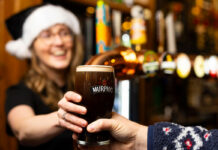Prevent poor pints with the perfect temperature

THERE’S no doubting draught beer’s popularity amongst consumers in the on-trade.
Sales of lager, ale and stout topped £1 billion in Scotland’s pubs and bars last year, according to CGA data, and with the lion’s share of those beers being poured from the tap, the significance of a well looked after cellar is hard to overstate.
To help serve perfect pints, as well as cut down on wastage, it’s essential to keep the cellar’s temperature between 11 and 13 degrees Celsius, experts told SLTN.
Stephen Dickson, Tennent Caledonian Breweries’ dispense quality manager, said: “This temperature is ideal to prevent gas absorption into the product. If the temperature falls below this parameter it will cause fobbing product.
“Subsequently gas migration can occur if the temperature rises above this range, which causes flat dispense.
“A refrigerated cellar also increases the shelf life of the product similar to the difference to keeping a pint of milk in the fridge overnight or leaving it on the kitchen worktop. Which would you be more keen to drink?”
Heineken’s category and trade marketing director, Jerry Shedden, agreed.
“The optimum temperature for conditioning cask ale is 11 to 13 degrees and, as such, it is important that the cellar temperature is kept between these two figures,” he said.
“If the cellar is too cold, cask ales will be flat and may have a chill haze.
“And if too warm, beer may develop a fob which causes wastage – if just one pint is poured into a drip tray each day this equates to over £1300 in lost revenue per year, per tap.”
In order to maintain optimum temperature in the cellar, Shedden advised operators to install a wall-mounted thermometer, regularly top up cooling equipment with water, check fans and condensers are free from dust and blockages as well as keeping a planned schedule of maintenance to help avoid expensive breakdowns.
Poor cellar management in the form of fluctuating temperatures will affect the quality of the beer served and the offending bar’s long-term reputation, stated Hubbard Products’ commercial director, Dougie Stoddart.
If just one pint is poured into a drip tray each day this equates to over £1300 in lost revenue per year.
He said: “Serving good beer is critical. Over 90% of consumers say quality is the most important factor, and two-thirds will reject a pint if it is perceived to be poor quality.
“Ordering the correct size of cask is also important, as is not over-ordering, and the aim should be to sell a cask within three days.”
When it comes to stocking only what you need, Carl Goode, product and marketing manager at BOC Sureserve, warned against stockpiling too much dispense gas.
He said: “Too many cylinders will compromise space in the cellar and if they are not properly secured, they can be a tripping hazard. Keep only the amount of cylinders suitable for your business.”
Lay a solid foundation in the cellar
Keep cellars clean, storing a minimum volume of non-beer, wine and soft drinks:
Using the cellar for general storage can place an additional burden on the cooling system, which in turn can affect its efficiency. When the system works harder to stay cool, this increases the amount of energy
and therefore costs.
Wash the cellar floor and walls every week, ensuring any spillages are cleaned up immediately:
Unclean cellars mean the surrounding air is dirty; this is particularly dangerous for cask beer, which draws in a pint of air with every pint poured and puts it at risk of contamination from wild yeast and bacteria. Avoid using strong-smelling or chlorine-based products when cleaning, as this can affect the taste of the beer.
Wash and sterilise all utensils and nozzles after use, but do not leave them to soak overnight:
Dirty utensils and nozzles are unhygienic and could damage the taste of the beer, but overnight soaking can contaminate the air in the cellar. Rinse equipment under warm running water to remove the beer residue, and then leave to soak for 10 to 20 minutes in water with a sanitising tablet. Never soak nozzles in soda water, as this helps bacteria to thrive and multiply. Always rinse utensils and nozzles under cold water before use. Fixed spouts should be cleaned with a stiff brush, sanitiser spray and then left to dry.
Turn off the gas supply between serving sessions:
This will prevent the keg becoming over-carbonated and minimises the health and safety risk of a CO2 leak in a confined space. Over-carbonation upsets the equilibrium, or optimum gas, levels inside the keg, which can result in fobbing and wasting.
– Provided by Heineken.























